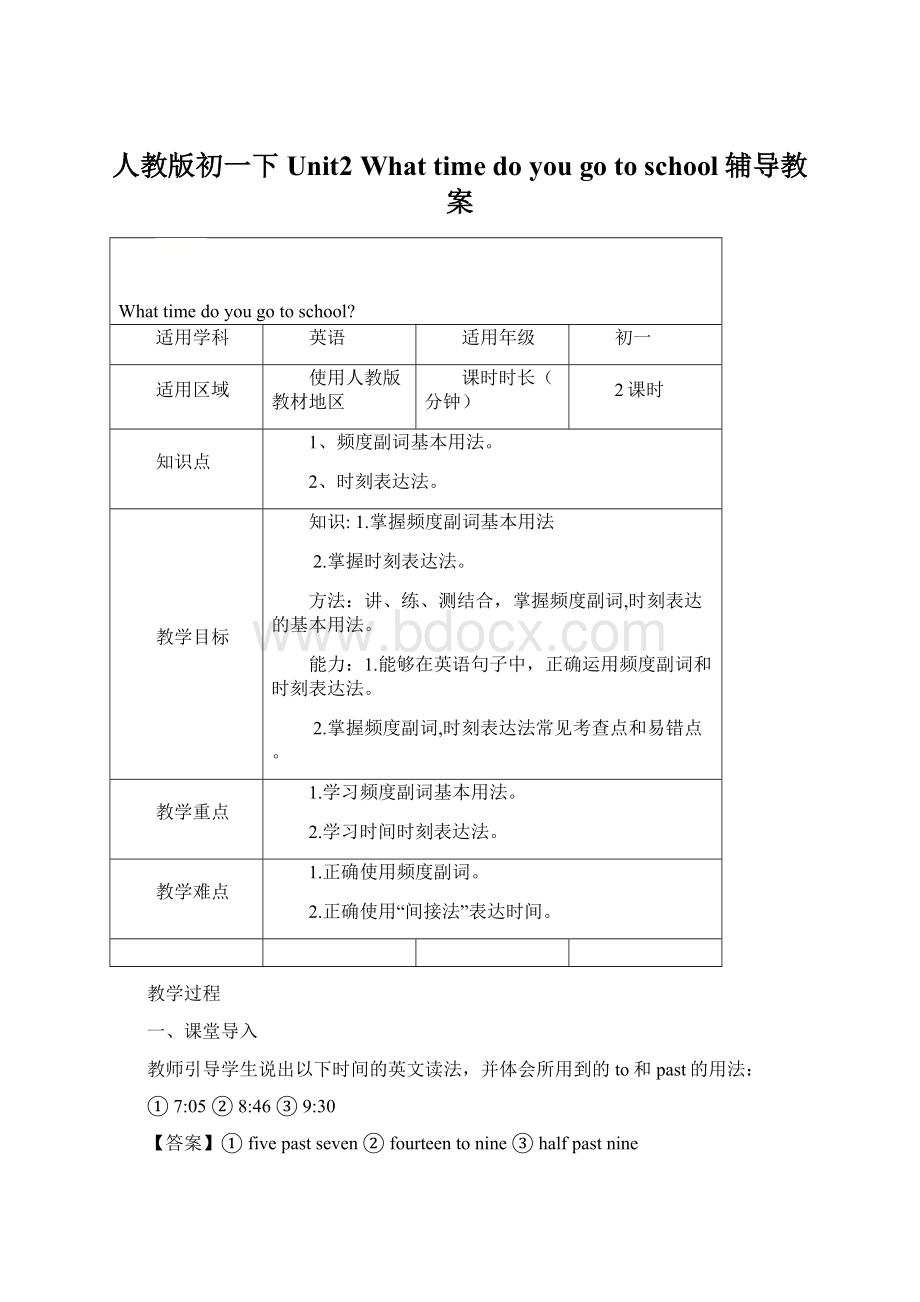人教版初一下 Unit2 What time do you go to school辅导教案.docx
《人教版初一下 Unit2 What time do you go to school辅导教案.docx》由会员分享,可在线阅读,更多相关《人教版初一下 Unit2 What time do you go to school辅导教案.docx(11页珍藏版)》请在冰豆网上搜索。

人教版初一下Unit2Whattimedoyougotoschool辅导教案
Whattimedoyougotoschool?
适用学科
英语
适用年级
初一
适用区域
使用人教版教材地区
课时时长(分钟)
2课时
知识点
1、频度副词基本用法。
2、时刻表达法。
教学目标
知识:
1.掌握频度副词基本用法
2.掌握时刻表达法。
方法:
讲、练、测结合,掌握频度副词,时刻表达的基本用法。
能力:
1.能够在英语句子中,正确运用频度副词和时刻表达法。
2.掌握频度副词,时刻表达法常见考查点和易错点。
教学重点
1.学习频度副词基本用法。
2.学习时间时刻表达法。
教学难点
1.正确使用频度副词。
2.正确使用“间接法”表达时间。
教学过程
一、课堂导入
教师引导学生说出以下时间的英文读法,并体会所用到的to和past的用法:
①7:
05②8:
46③9:
30
【答案】①fivepastseven②fourteentonine③halfpastnine
二、复习预习
教师引导学生复习一般现在时和动作的频度,并对常见的often,usually,always等词划分频度。
三、知识讲解
知识点1单元知识梳理
1.时间表达法
2.词汇:
1)名词n.job,work,
2)副词adv.频度副词
3)介词prep.表示时间的介词
3短语:
getup,takeawalk,belatefor,inthemorning,begoodfor,either...or...
4句型:
Whattimedoyouusuallygetup?
Afterschool,Isometimesexerciseforhalfanhour.
知识点2重点知识精讲
1.time.n.
【考查点】一时间;时刻(不可数)
如;Whattimedoyouhavetogointomorrow?
你明天什么时候必须开始照常工作?
习惯用法:
haveagoodtime玩的愉快
Whatagoodtime!
多么愉快的时光呀!
【考查点】二表示次数;倍数(可数)
如:
Yoursisthreetimesthanmine.你的比我的大两倍。
【考查点】三一般情况下whattime=when
如:
Whattime/whendoyoueatbreakfasteverymorning?
你每天早上什么时间时间吃早饭?
【考查点】四常用词组;
Whattime几点;什么时间ontime准时intime及时
haveagoodtime。
玩的愉快
Whatagoodtime!
多么愉快的时光呀!
Sometimes 有时 ; allthetime一直
2.gotoschool去上学
如:
Ourschoolisquiteclosetoourhome.Sowecangotoschooltogetherbybike.
我们的学校离我家不远,因此我们可以一块骑自行车去上学。
【考查点】类似短语;gotobed上床睡觉;gotouniversity上大学;gotowork去上班
3.work.n.
【考查点】work.n工作(不可数,同类词;homework,housework);v.工作,劳动.
如:
Hisworkhasnovalue.他的工作没有价值。
Weworkfromninetofive.我们从九点工作到五点。
【易错点】work与job
work(不可数名词);job(可数名词)
如:
Theysupporteachotherintheirwork.他们在工作中互相支持。
agoodjob干得出色的活儿;做得好的事
Whydidyouthrowupsuchagoodjob?
你为什么放弃了这么好的一个工作?
4.either.conj
【考查点】一either.conj.也(用于否定句或否定词组后)。
如:
Ifyou'renotgoingI'mnotgoingeither.你不去,我也不去。
【考查点】二pron.任一,两方,随便哪一个;
如:
Didyoueverworkwitheitherofthem?
你曾经和他们两位中的一个工作过吗?
【考查点】三either...or不是…就是…;或者…或者(遵循就近原则)…
如:
EitheryouorIamtogo. 你或我必须有人去。
Eitherheoryouareright. 要么他对,要么你对。
5.usuallyadv.
【考查点】usually通常,经常.常与一般现在时连用,位于系动词/助动词/情态动词之后,实义动词之前。
如:
Whatpeopleusuallydoonthisday?
人们在这天通常做些什么?
Iusuallygoshoppingwithmyaunt.我通常和我阿姨一起去购物。
【易错点】频度副词always,usually,often,sometimes,hardly,never之区别。
上述词频率比较如下(按百分比):
always(总是100%),usually(经常90%)often(常常60%)sometimes(有时40%),
hardly(几乎不5%),never(从不0%)
如:
Shealwayswaslate.她老是迟到。
Janeusuallygoestoworkbybike.简通常骑自行车上班。
Weoftengettogether.我们常常聚会。
Hesometimesgoesthereonbusiness.他有时到那里出差。
Hecanneverunderstand.他永远也不会明白的。
6.sometimesadv.
【考查点】有时,间或(常与一般现在是连用)
如:
SometimesIliketothinkaboutthis.有时我很喜欢做这样的设想。
7.neveradv.
【考查点】never从未;决不,相似词;ever 曾经
如:
Heneverdrinksspirits.他从来不喝烈酒。
知识点3语法讲解与练习:
表示时刻(介词用at)
【考查点】一.顺读法----先时后分,“几点几分”
9:
30读作ninethirty6:
21读作sixtwenty-one
【考查点】二.逆读法----先分后时
1)表示“几点过几分”,半小时以内,介词用past,分钟数+past+钟点数。
10:
10读作tenpastten8:
20读作twentypasteight
2)表示“几点差几分”,半小时以上,介词用to,60减原分钟+to+(下一个)钟点数
9:
50读作tentoten7:
40读作twentytoeight
3).15分钟:
aquarter30分钟:
ahalf
9:
15读作aquarterpastnine12:
30读作halfpasttwelve
四、例题精析
【例题1】
【题干】____doyoueatbreakfasteverymorning?
AWhattimeB.WhentimeC.WhattimesD.Whichtime
【答案】A
【解析】本题考查whattime对时间提问,故选A。
【例题2】
【题干】I________watchthisTVprogram.It'sveryinteresting.
A.oftenB.neverC.hardlyD.seldom
【答案】A
【解析】考查频率副词。
often意为“常常”;never意为“从不”;hardly意为“从不”;seldom意为“很少”。
由后句“它是非常的有趣”知,前句意为“我常常看电视节目”。
所以选择A。
【例题3】
【题干】–Doyouoftengofishingwithyourfather?
–No,_______.Idon’tlikefishingatall.
A.neverB.alwaysC.usuallyD.seldom
【答案】A
【解析】考查频度副词。
句意“你常常和你爸爸去钓鱼吗?
”“不,我根本不喜欢钓鱼”。
根据情境,是一个完全否定的回答。
always与usually表示经常干某事,与情境不符。
Seldom是很少的意思,与后面句子“根本就不喜欢”意思不符,故选A。
【例题4】
【题干】Wejustneedoneofyouforthegame.______you_______yourbrothercanjoinus.
A.Both;andB.Neither;norC.Either;orD.Notonly;butalso
【答案】C
【解析】本题考查连词用法,根据句意“我们仅仅需要你们掌中的一个参加那个比赛,或者你或者你的兄弟可以加入我们”。
因此答案为C
四.课堂运用
【基础】
选择填空。
1.―What'sthetime?
―_____halfpastnine.
A.ItsB.It'sC.ThisisD.They're
2.Wegoto_____atsixthirtyinthemorning.
A.theschoolB.aschoolC.schoolD.schools
3.—______doesyourmotherwork?
—Inaschool.
A.WhatB.HowC.WhereD.When
4.—Whattimeisit?
—It's____eighto'clock.
A.atB.onC.inD.around
5.Lucy’sbrotherhas.
A.ainterestingworkB.aninterestingjob
C.ainterestingjobD.aninterestingwork
6.Doyouwanttolistentothe_____story?
A.funnilyB.funnyC.funyD.funnier
7.WhattimedoesJane______afterschool?
A.doherhomeworkB.doesherhomework
C.doherhomeworksD.doesherhomeworks
8.Heoftentakes______totheSantonHotel.
A.numberbus17B.thenumber17bus
C.17numberbusD.number17bus
9.I______atteno'clockintheevening.
A.havebreakfastB.getupC.gotobedD.watchmorningTV
10.Heeats______dinnerat7:
30intheevening.
A.aB.anC.theD./
11.Pleasewriteandtellme______yourmorning.
A.forB.toC.aboutD.of
12.______LucyandLilygohomeatseven?
A.DoB.DoesC.IsD.Are
13.It'steno'clock.Imustgo____.
A.tohomeB.homeC.myhomeD.hishome
14.Iwantto____No.5bustoTian'anMenSquare.
A.getB.comeC.goD.take
15.---Willyougothereby_____train?
----No,,I’lltake______taxi.
A./;aB.a;theC./;/D.the;a
16.Weonlyhave_______shower.
A.someB.anC.theD.one
17.Mysister____homeat5:
00everyday.
A.getsB.getstoC.getD.getto
18.WecanwatchBeijingOpera_____TV.
A.inB.atC.onD.from
19.Let’s________.
A.takeashowerB.haveashowerC.taketheshowerD.AandB
20.Mybrother___themorningTVeveryday.
A.watchesB.watchC.watchsD.see
21.Doyouknow___________________?
A.whatishisjobB.whatdoeshisjob
C.whathisjobdoesD.whathisjobis
22.Helikes______theradio(收音机)。
A.listensB.tolistentoC.listenstoD.tolisten
23.Rickoftendoes____homeworkat6:
00.
A.herB.hisC.myD.your
24.---______dopeoplehavedinner?
---Athome.
A.WhatB.WhenC.WhereD.BandC
25.JieMinusuallygetsup_______.
其实,任何一门学科都离不开死记硬背,关键是记忆有技巧,“死记”之后会“活用”。
不记住那些基础知识,怎么会向高层次进军?
尤其是语文学科涉猎的范围很广,要真正提高学生的写作水平,单靠分析文章的写作技巧是远远不够的,必须从基础知识抓起,每天挤一点时间让学生“死记”名篇佳句、名言警句,以及丰富的词语、新颖的材料等。
这样,就会在有限的时间、空间里给学生的脑海里注入无限的内容。
日积月累,积少成多,从而收到水滴石穿,绳锯木断的功效。
A.atsixthirtyB.atthirtysixC.onsixthirtyD.onthirtysix
26.Inourschool,school_____at7:
30.
A.isB.startC.startsD.does
27.----Whendoesyourmothergoshopping?
----Usually_____Sundaymorning.
A.onB.inC.atD.after
28.---_____________?
---Sorry,Ican’t.
A.CanyouplaythedrumsB.Doyoudraw
C.AreyouhereD.Canyourbrotherdance
29.---Doyouhaveawatch?
---________.
A.Yes,hedoesB.No,I’mnotC.No,Idon’tD.Idon’tknow
30.Theyhavenoclasses________SaturdayandSunday.
A.inB.onC.atD.from
【答案】1-5BCCDB6-10BABCD11-15CABDA
16-20DACDA21-25DBBCA26-30CAACB
【巩固】
词语运用。
1.Let’s______(clean)theclassroom.
2.He______(notgo)tobedat8:
30.
3.She______(do)herhomeworkat7:
00intheevening.
4.Scott________(work)verylonghours.
5.Whattime_______youusually_____(get)up?
6.Hissisterloves________(play)thepianoverymuch.
7.Myfather________(watch)TVintheevening.
8.CanGina__________(swim),doyouknow?
9.Doyouwant______________(know)aboutmyschool?
10.Wehavefour__________(class)inthemorning.
【答案】
1.clean2.doesn’tgo3.does4.works5.do,get
6.toplay7.watches8.swim9.toknow10.classes
【拔高】
连词成句
1.eat,breakfast,Jack,home,does,at
_______________________________________________?
2.works,long,Scott,very,day,hours,every
_______________________________________________.
3.goes,bed,Tim,usually,to,10:
00,at
_______________________________________________.
4.a,time,breakfast,that,is,funny,for
_______________________________________________.
5.school,I,late,am,never,for
_______________________________________________.
6.breakfast,I,for,time,don’t,much,have
____________________________________________________.
7.I,twelve,have,to,lunch,quarter,a,at
____________________________________________________.
8.life,I,healthy,very,a,have
____________________________________________________.
9.eating,after,you,teeth,need,brush,to,your
____________________________________________________.
10.what,school,time,to,do,go,you
____________________________________________________?
【答案】
1.DoesJackeatbreakfastathome?
2.Scottworksverylonghourseveryday.
3.Timusuallygoestobedat10:
00.
4.Thatisafunnytimeforbreakfast.
5.Iamneverlateforschool.
6.Idon’thavemuchtimeforbreakfast.
7.Ihavelunchataquartertotwelve.
8.Ihaveaveryhealthylife.
单靠“死”记还不行,还得“活”用,姑且称之为“先死后活”吧。
让学生把一周看到或听到的新鲜事记下来,摒弃那些假话套话空话,写出自己的真情实感,篇幅可长可短,并要求运用积累的成语、名言警句等,定期检查点评,选择优秀篇目在班里朗读或展出。
这样,即巩固了所学的材料,又锻炼了学生的写作能力,同时还培养了学生的观察能力、思维能力等等,达到“一石多鸟”的效果。
9.Youneedtobrushyourteethaftereating.
要练说,得练看。
看与说是统一的,看不准就难以说得好。
练看,就是训练幼儿的观察能力,扩大幼儿的认知范围,让幼儿在观察事物、观察生活、观察自然的活动中,积累词汇、理解词义、发展语言。
在运用观察法组织活动时,我着眼观察于观察对象的选择,着力于观察过程的指导,着重于幼儿观察能力和语言表达能力的提高。
10.Whattimedoyougotoschool?
“教书先生”恐怕是市井百姓最为熟悉的一种称呼,从最初的门馆、私塾到晚清的学堂,“教书先生”那一行当怎么说也算是让国人景仰甚或敬畏的一种社会职业。
只是更早的“先生”概念并非源于教书,最初出现的“先生”一词也并非有传授知识那般的含义。
《孟子》中的“先生何为出此言也?
”;《论语》中的“有酒食,先生馔”;《国策》中的“先生坐,何至于此?
”等等,均指“先生”为父兄或有学问、有德行的长辈。
其实《国策》中本身就有“先生长者,有德之称”的说法。
可见“先生”之原意非真正的“教师”之意,倒是与当今“先生”的称呼更